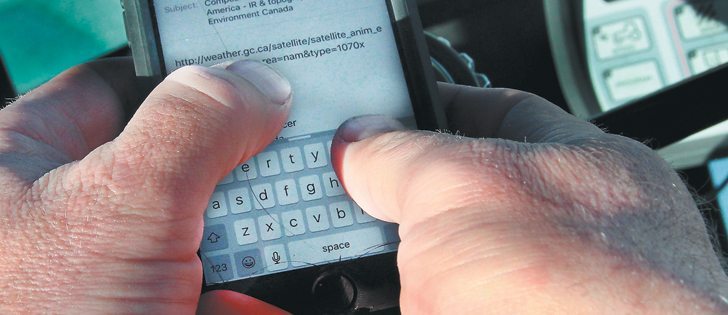As the use of technology is expanding and more of the things we do require a computer and basic computer literacy, the younger generation would seem to have a major advantage. They have serious finger skills.
On the other side is my mother-in-law; she has happy fingers. Usually something happy is good, but in regards to computer use, happy fingers is not a good thing.
I’m sure this term has been around for some time and I’m not going to claim to have created it. It describes a person who gets too active on the computer keyboard or any other technology where there are buttons, without knowing what is going on.
Read Also

Growing garlic by the thousands in Manitoba
Grower holds a planting party day every fall as a crowd gathers to help put 28,000 plants, and sometimes more, into theground
I am going to pick on my mother-in-law (she is unlikely to ever read this) to illustrate what happy fingers are. She and my father-in-law signed up for cable TV several years ago. This necessitated a convoluted arrangement of cabling so that the receiver worked with the DVD and VHS players that they used. We ended up with three remotes for all of the devices. After some work, I got it down to one remote control to control everything.
The problem was that there were still too many buttons. She couldn’t remember all of the instructions and would lose her patience. Then the happy fingers would start, pushing buttons at random. When the software didn’t do what she expected, she would start pressing a few other buttons.
By the time she called me, TV and receiver settings would be so messed up I would just unplug and reset everything.
There is also something I call dead fingers. These fingers belong to people that are afraid of touching anything on the keyboard for fear they will kill the machine.
I once had a female student in an introduction to computer class that was scared of the keyboard. After some instruction that would require typing on the keyboard, she would just sit and look at it. I would literately have to point directly at every key and encourage her to press each one before she would do anything. This is understandable for the first week or two, but by midterm she was still too scared to do anything on the computer by herself.
I’ll admit that my small screen skills are not very good and that I have fat fingers that prevent me from being accurate on those tiny keys on my phone. I’m always amazed how fast my daughter can tap out a text messages. It seems that most of the younger generation have fast fingers and have no problem tapping out a message with one hand tied behind their back.
These people have grown up with computers and it is a part of their lives.
My first exposure to computers was in 1980, my first year of teaching when I had an Apple IIe in my classroom. I am a gadget guy so I was fascinated by the technology and have continued to learn. However, not everybody in my generation is enamored with technology or got the early start for which I had the opportunity.
Many people my age or older have happy fingers, which they use to randomly hit keys hoping to get positive results.
The younger grower or computer operator doesn’t typically have these problems. They aren’t afraid of exploring a new computer or running through the latest software, clicking and tapping away. If they get lost or run into an error, they can get themselves out of it.
The lesson here is that in precision farming, we have young technicians with smart and fast fingers that are supporting and assisting a slightly older generation of growers with happy fingers. How can we help those happy fingers?
For my mother-in-law, I used pieces of tape to cover 90 percent of the buttons on the remote, leaving only those buttons that she absolutely needed. This allowed her to see more clearly and reduce her choices of what she could push.
Applying this concept for the technology challenged grower, it means easier displays in the tractor along with more intuitive menu structures.
Displays and menus have im-proved over the last few years but our happy fingered growers may still have problems.
Something else that helped my mother-in–law was a cheat sheet that I created with a diagram of the remote and simple step by step instructions on how to change the channel or how to watch a DVD.
Cheat sheets can also be created by precision ag specialists for their growers. They can have icons, screen shots, and basic instructions for major tasks and correcting minor problems. Laminate the cheat sheet and it can be a permanent accessory in the tractor cab.
The last thing I did for my mother-in-law was to be available when she had a problem.
Patience and availability assured her and she didn’t end up hitting every button on the remote before calling; she would call before undoing every setting. Technicians need to be available for their happy fingered growers and have patience with them.
Though I am making fun of happy fingers, the main point is that support services are still a need within the precision farming industry.
There are many growers out there who want to do precision farming but they lack the knowledge and ability to use technology. Precision happens when we make technology accessible to all.
Terry A. Brase is an educational consultant, former precision agriculture educator and author. BrASE LLC. Contact him at precision.happens@producer.com


















